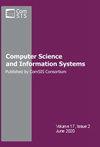SRDF_QDAG: An efficient end-to-end RDF data management when graph exploration meets spatial processing
IF 1.2
4区 计算机科学
Q4 COMPUTER SCIENCE, INFORMATION SYSTEMS
引用次数: 0
Abstract
The popularity of RDF has led to the creation of several datasets (e.g., Yago, DBPedia) with different natures (graph, temporal, spatial). Different extensions have also been proposed for SPARQL language to provide appropriate processing. The best known is GeoSparql, that allows the integration of a set of spatial operators. In this paper, we propose new strategies to support such operators within a particular TripleStore, named RDF QDAG, that relies on graph fragmentation and exploration and guarantees a good compromise between scalability and performance. Our proposal covers the different TripleStore components (Storage, evaluation, optimization). We evaluated our proposal using spatial queries with real RDF data, and we also compared performance with the latest version of a popular commercial TripleStore. The first results demonstrate the relevance of our proposal and how to achieve an average gain of performance of 28% by choosing the right evaluation strategies to use. Based on these results, we proposed to extend the RDF QDAG optimizer to dynamically select the evaluation strategy to use depending on the query. Then, we show also that our proposal yields the best strategy for most queries.SRDF_QDAG:当图探索遇到空间处理时,有效的端到端RDF数据管理
RDF的流行导致了几个具有不同性质(图、时间、空间)的数据集的创建(例如,Yago、DBPedia)。还为SPARQL语言提出了不同的扩展,以提供适当的处理。最著名的是GeoSparql,它允许集成一组空间操作符。在本文中,我们提出了新的策略来支持特定TripleStore中的这些操作符,称为RDF QDAG,它依赖于图碎片和探索,并保证了可伸缩性和性能之间的良好折衷。我们的建议涵盖了不同的TripleStore组件(存储、评估、优化)。我们使用具有真实RDF数据的空间查询来评估我们的建议,并且还将性能与流行的商业TripleStore的最新版本进行了比较。第一个结果证明了我们的建议的相关性,以及如何通过选择正确的评估策略来实现28%的平均性能增益。基于这些结果,我们建议扩展RDF QDAG优化器,以便根据查询动态选择要使用的求值策略。然后,我们还展示了我们的建议为大多数查询产生了最佳策略。
本文章由计算机程序翻译,如有差异,请以英文原文为准。
求助全文
约1分钟内获得全文
求助全文
来源期刊

Computer Science and Information Systems
COMPUTER SCIENCE, INFORMATION SYSTEMS-COMPUTER SCIENCE, SOFTWARE ENGINEERING
CiteScore
2.30
自引率
21.40%
发文量
76
审稿时长
7.5 months
期刊介绍:
About the journal
Home page
Contact information
Aims and scope
Indexing information
Editorial policies
ComSIS consortium
Journal boards
Managing board
For authors
Information for contributors
Paper submission
Article submission through OJS
Copyright transfer form
Download section
For readers
Forthcoming articles
Current issue
Archive
Subscription
For reviewers
View and review submissions
News
Journal''s Facebook page
Call for special issue
New issue notification
Aims and scope
Computer Science and Information Systems (ComSIS) is an international refereed journal, published in Serbia. The objective of ComSIS is to communicate important research and development results in the areas of computer science, software engineering, and information systems.
 求助内容:
求助内容: 应助结果提醒方式:
应助结果提醒方式:


